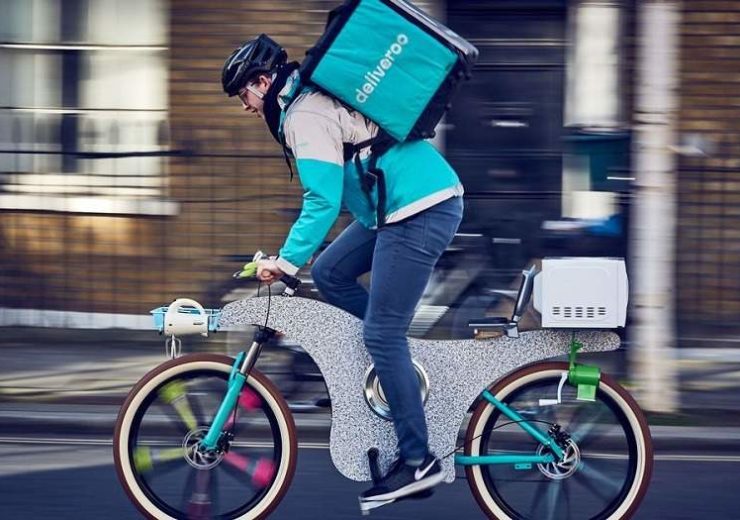Don't make new hires stump up huge costs to get started and use "gamification" tools to incentivise desirable traits such as loyalty and quality of work

Deliveroo is one of the main companies associated with the gig economy (Credit: Deliveroo)
The gig economy continues to grow with companies like Uber and Deliveroo at its heart – but questions remain over workers’ rights. Roger Beadle, CEO of gig customer experience platform Limitless, discusses how companies in the sector can enshrine good working practices through lower entry barriers, local market compliance and fair rewards.
The gig economy has redefined how people work, and how organisations procure talent around the world.
Don’t let the “demise” of Uber in London fool you – in the UK, the Office for National Statistics, and the Association of Independent Professionals and the Self-Employed (IPSE), recently revealed that “the burgeoning freelance sector now has over two million people and has doubled in size over the past three years”.
Growth of gig economy working
In the US, gig working is also on the rise, with research by Edelman Intelligence stating: “Nearly half of Generation Z workers (defined as people born between 1995 and 2005) are freelancers.
“With 61 million Gen Z expected to be joining the workforce in the next few years, it appears many will be opting for a freelancing gig instead of or along with a more traditional nine to five job.”
From a global brand and enterprise perspective, gig-based customer service is proving to be a valuable tool in winning the war on talent and operating cost-effectively in a competitive environment.

Employers are relying on giggers to maintain a flexible workforce that is available on-demand 24/7 globally.
This approach also allows companies to cut costs and invest savings in other parts of the business to stay ahead of the curve.
Look at Microsoft, for example – it has acknowledged that it views the gig economy as a key sourcing strategy for its global customer services operations.
Two sides of the gig economy coin: Workers’ rights are important too
Still, these benefits must be balanced with the acknowledgement that the gig economy can be exploitative and can often leave workers vulnerable and exposed.
Gig workers, as independent contractors, do not receive benefits, like pensions or sick pay, from the companies that contract them; rather, they must procure them on their own.
People are paid per “gig” and for some, this means there can often be a lot of idle time in between projects.
For those with financial commitments such as mortgages, the insecure nature of the work can lead to stress and ill-health as they worry about their income.
In the past, Uber and DX have come under fire for not doing enough to protect the interests of their drivers. It’s clear that legislation and employment regulations are yet to catch up to the requirements of the emergent gig workforce.
How to give gig economy workers equal rights
So how can companies maintain a “good gig” at all times? Here are four steps I’d recommend:
Be compliant in local markets
You need to ensure that every market you operate in has localised contracts to safeguard the interests of your workforce.
It’s time to acknowledge that there is an increased global focus on the employment status of gig workers and guarantee that, wherever your gig workers are based, they will be protected under their own governing law and jurisdiction.
Lower the barrier to entry for gig workers
It’s important that your business model doesn’t require gig workers to make huge upfront investments or place unfair demands on their time.
Workers “gig” as they enjoy the flexibility and freedom of choice it offers. So, make sure to preserve these benefits in order to keep gigging as an attractive option for the agile workforce.
Another side to this is ensuring that, as a platform, you offer workers the opportunity to choose the work they want to do, and are receptive to their time and resource constraints.

It isn’t sustainable to penalise workers for choosing some jobs over others, or even choosing not to do any at all at a certain time.
This also helps you rest easy that workers aren’t becoming too dependent on the income they earn via your platform, especially if you can’t offer predictable and consistent levels of work.
Overall, it may be better to have more people doing a little, rather than a few doing a lot.
Offer truly fair rewards
Recognise the importance of a fair and objective rewarding mechanism for gig workers.
Without recognising the great work your workers are doing, it’s all too easy for them to feel undervalued.
“Gamification” tools can also help incentivise desirable traits such as loyalty and quality of work.
In gig customer service, for example, your platform could offer its gig users rewards for maintaining high customer satisfaction scores, through preferential access to more customer service tickets.
Enshrine sustainable working practices
Ethical considerations are becoming ever more important for employees when they choose where to work.
Gig working models can often avoid the traditional carbon footprint of a bricks and mortar set up.
For instance, we can envision a world with gig customer teams serving different global markets without using service centre buildings or burning carbon through commuting.
As gig workers become more discerning, it will pay to enshrine ethical and social responsibility in your business, both in terms of the existing benefits of gig working for the environment, but also in going above and beyond your obligations.
This could be along the lines of publishing your carbon footprint figures and public plans on how to offset your environmental impact.
Why gig economy growth must be regulated
The gig economy is booming and is an indicator of the direction the modern-day jobs market is taking.
While this has sparked a revolution in how people work and access talent, it is important to temper this growth with regulation and innovative practices which safeguard workers’ interests.
Legislative bodies, technology companies and gig workers themselves need to come together and work on creative solutions which benefit all.
The conversations should start today – change for the better will inevitably follow.


